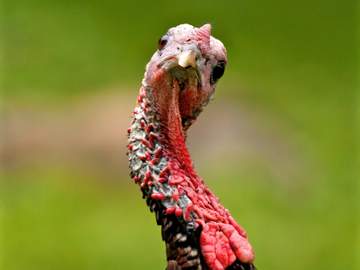
‘Turkey’
Lookups for turkey have been on the rise in this, the final week of November. Fancy that.
The wild turkey is South Carolina’s second-most popular game animal behind the white-tailed deer, and years ago turkey hunting was a fall and winter thing. At some point, probably in the 1960s to 1970s, a transition was made to a spring turkey season. That’s the time hunters prefer because that’s when the turkeys are breeding, gobblers are gobbling and strutting and responsive to hens. In the fall it’s difficult to differentiate between male and female turkeys because jakes don’t look much different from a hen in the fall.
— Tommy Braswell, The Post and Courier (Charleston, South Carolina), 24 Nov. 2024
When turkey was introduced to Europe by the Spanish in the 16th century, English speakers gave credit to the Turks: the Ottoman Empire was at its peak, and the English were in the habit of calling all sorts of things “Turkish.” Maize was called “Turkish wheat,” pumpkins were referred to as “Turkish cucumbers,” and Meleagris gallopavo was a “turkey-cock,” and, eventually, a plain old turkey.
‘Fluoride’
Fluoride has been much in the news lately, due to various local and national proposals to eliminate the fluoridation of public drinking water, leading to an uptick in the number of lookups for fluoride.
Made from one of the most common elements on Earth, fluoride is naturally present in human bodies and water, and common in toothpaste and mouthwash. And for decades, the mineral has been added to the water supplies of thousands of communities across the United States to help prevent dental cavities and decay. Dental professionals believe this practice is an effective and affordable approach to oral well-being, and consider it among the country's 10 most significant public health achievements of the 20th century.
— Adriana Pérez, The Chicago Tribune, 24 Nov. 2024
Fluoride is a compound of fluorine, a nonmetallic gaseous chemical element of the halogen group with atomic number 9 that readily forms compounds with almost all other elements including some noble gases. The first-known use of fluoride in English appeared in the early 1800s.
‘Tariff’
Lookups for tariff climbed this week following statements made by president-elect Donald Trump announcing his intentions to impose steep tariffs on goods from several countries.
President-elect Donald J. Trump said on Monday that he would impose tariffs on all products coming into the United States from Canada, Mexico and China on his first day in office, a move that would scramble global supply chains and impose heavy costs on companies that rely on doing business with some of the world’s largest economies. … Taken together, the tariff threats were a dramatic ultimatum against the three largest trading partners of the United States, and a move that threatens to sow chaos in America’s diplomatic and economic relationships even before Mr. Trump sets foot in the White House.
— Ana Swanson, et al., The New York Times, 25 Nov. 2024
We provide a range of meanings for tariff, including “a schedule of duties imposed by a government on imported or in some countries exported goods,” “a schedule of rates or charges of a business or a public utility,” and “price, charge.” Tariff came into English at the end of the 16th century, borrowed from the Italian tariffa, which itself came from the Arabic word taʽrīf, meaning “notification.”
‘Bird flu’
Bird flu has seen increased lookups as the virus has spread.
Bird flu has been detected in a sample of raw milk sold in California raising fears about the continued spread of the virus, state officials reported. … California officials have regularly been testing raw milk samples as a response to the flu. The discovered sample was tested by the Santa Clara county public health laboratory. Health officials have long warned against the consumption of raw milk, as interest in the beverage rises. Unlike pasteurized milk, which is heated to kill bacteria, raw milk carries a higher risk of food-borne pathogens.
— Gloria Oladipo, The Guardian (London, England), 25 Nov. 2024
We define bird flu as a synonym of avian influenza and specifically, “severe often fatal influenza A caused by strains of a subtype (H5N1) of the causative orthomyxovirus that have produced epidemics in domestic birds especially in Asia with sporadic associated human infections.”
Word Worth Knowing: ‘Consopite’
Consopite is an obsolete word defined in our Unabridged dictionary as “to lull to sleep.” It comes from the Latin verb consopire meaning “to put to sleep” or “to make unconscious.” Coincidently enough, consopire can also mean “to make obsolete.” Consopite only appeared in English for a brief window of time before being consopited, as it were, but if the tryptophan in your holiday bird caused you to doze off prematurely this week, you are welcome to explain to your family that you were consopited. (Just don’t, it needs be said, confuse consopite with a more familiar verb of Latin origin: constipate.)




